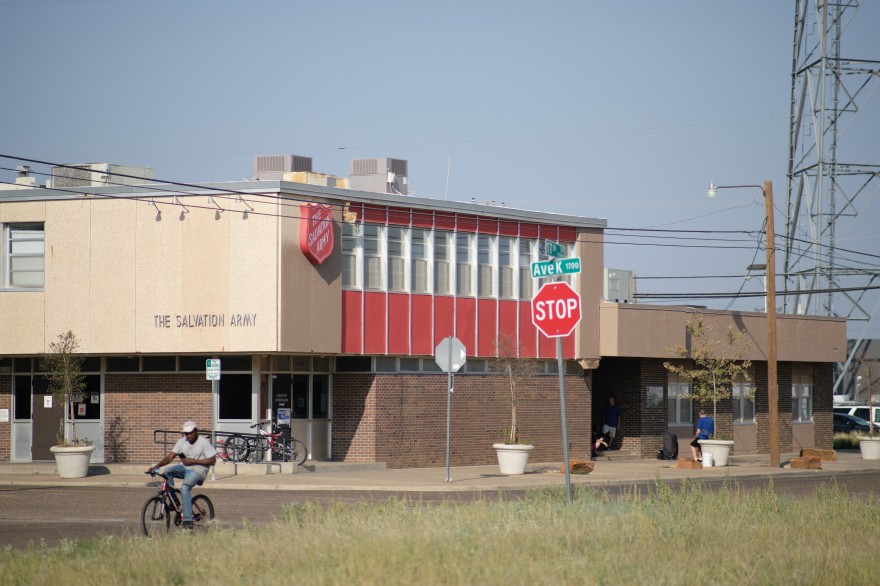Chad Wheeler walks into the community center at Open Door. In a back office, two employees are ready to help the homeless people the nonprofit serves.
“Wherever they are in their journey,” Wheeler said, “this is the place where they can connect with what they need.”
The organization is just one point of entry for people experiencing homelessness to get help. Wheeler, the CEO of Open Door, said that process starts with an online survey that’s shared in a local database for homeless service providers. It helps identify and prioritize needs. For example, Wheeler said if they know a client is a veteran, they can connect them with specific services for that group.
The local organizations who serve the homeless population have used this collaborative virtual screening process for several years – and Wheeler said it works.
The dropping number of homeless people in Lubbock supports that. Between 2016 and 2020, the number of unhoused citizens decreased by about a third, according to data from the Texas Homeless Network. The 2020 point-in-time count identified 283 individuals experiencing homelessness. One in seven of those people were considered chronically homeless. More than half of people who responded to the question were unhoused for fewer than six months. While the point-in-time count happened earlier this year, the data set is considered incomplete because of pandemic complications.
Lubbock does not have homeless encampments like the ones in Austin and other areas affected by a new state law banning homeless camping in public. Still, the city is dealing with a controversial issue of its own: a newly created nonprofit’s plan to establish a homeless transition center that would turn that virtual screening process into a brick-and-mortar one. But, existing homeless service providers say it’s a solution without a problem.
Lubbock’s Homeless Haven
It’s not a new idea. In fact, a “diversion process to direct homeless individuals to housing and other needed services” was a short-term recommendation from a 2019 City of Lubbock committee to address homelessness and keep those in crisis out of the Lubbock County Detention Center. At the time, the jail was described as the largest homeless shelter in Lubbock.
Those involved with the proposed center say there is real momentum behind it now.
That momentum was formalized earlier this summer, when Lubbock’s Homeless Haven was registered as a nonprofit.
Downtown businessman and one of the directors for Lubbock’s Homeless Haven, David Alderson, said the center would be a part of addressing homelessness. Not the be-all and end-all solution.
“The transition center,” Alderson said, making an analogy about pieces of a puzzle, “is the piece that people have held their hand up and said ‘I don’t want to be homeless anymore. I want to get into a facility that offers me mental health, medical, job training. Things to help me get back on my feet.’”
Alderson said Lubbock’s Homeless Haven would not be a homeless shelter, though it could offer sleeping accommodations. The vision is a place where people in need can go to a single location to get help with the root causes of homelessness — like job training, income and addiction. The ultimate goal is housing.
Jerry Ramirez is a minister and the current president of the South Plains Homeless Consortium, another nonprofit that’s a collaborative effort between area homeless service providers. He, like Alderson, is a director for Lubbock’s Homeless Haven.
Ramirez said the model is similar to other centers in the state. Specifically, the Haven for Hope in San Antonio, which city and project leaders recently toured. There, Ramirez said hundreds of people who are homeless can spend the night, eat and connect with services. A 2020 report from the campus states that, after one year, 88% of people that exited with a housing placement did not return to homelessness
“To be excited about what they’re doing,” Ramirez said, “and then be able to take that and bring it to Lubbock and get to see people change one at a time. It’s just a holistic approach.”
Lubbock’s Homeless Haven is a privately-led effort at this point. The City of Lubbock released a statement last month clarifying it is not a partner at this time.
City Councilwoman Latrelle Joy said city and county leaders are a part of the ongoing discussions and could one day be some kind of partner in the organization. A public-private partnership could open up funding opportunities for the center. Allocating some American Rescue Plan Act money for the center has been discussed publicly.
Right now, there is no timeline for the opening of Lubbock’s Homeless Haven. Possible locations have been discussed, including the former South Plains Food Bank building that according to property records is now owned by the Lubbock Downtown Development Corp. Alderson said his goal is to have a location firmed up within the next year.
“I’ve Gotta Look At It With Concern”
While Alderson and Ramirez say some existing homeless service providers are on-board with the concept of Lubbock’s Homeless Haven, others are worried about the project.
“It’s easy to go visit one facility in San Antonio and think ‘oh, this fits all of the things I’d like to do.’ And boom it’s done,” Chad Wheeler from Open Door said. “I don’t know how much critical thinking has been put into that.”
Wheeler said one of his issues with the haven model is the method for addressing the root causes of homelessness. Open Door is a housing-first organization. That means they get people in stable housing and then help with other needs. The Haven would work in reverse by first focusing on needs with the goal of stable housing.
“There are many, many, many reasons why that model is not considered best practice,” Wheeler said.
The National Alliance to End Homelessness lists a community-wide coordinated approach to delivering services, housing and programs as a necessary step to aiding the homeless. But they also push the housing-first model, whether that’s shorter-term through what’s called rapid re-housing or a more permanent home.
As for Erica Hitt with the Salvation Army, she’s most worried about the location and possible duplication of services. Not all, but many homeless outreach organizations are within walking distance of the Salvation Army’s downtown campus. She says even if some of those agencies have a satellite office at Lubbock’s Homeless Haven, like the model in San Antonio, it could be redundant.
“They will still have their home base and their home base is going to be in our area,” Hitt said. “So, in my mind, that is a duplicate service.”
There’s more to it for both Hitt and Wheeler. So far, they said they’ve been left out of the planning process even though they’re the ones who directly work with the homeless. As the project progresses, they want a seat at the table to share their expertise.
“This is what I do. This is my jam. I love these people,” Hitt said. “So anything that’s going to hurt getting them housed and slow the process, I’ve gotta look at it with concern.”
The Haven’s Ramirez said communication between stakeholders will improve, but everyone has to be willing to work together.
“It is key that we all come together and work on it. These little silos on the sides – those have to go away,” Ramirez said. “Because the way this is going to work is we’re going to move forward and you may get left behind.”
If you found the reporting above valuable, please consider making a donation to support local nonprofit journalism. Thanks for donating today.













